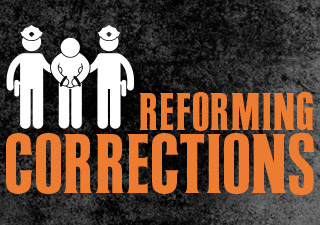Media
Unlocking Corrections Reform: A Summary of SB 100
 A Look at Senate Bill 100
A Look at Senate Bill 100
SB 100 incorporates evidence-based reforms to make the state’s corrections system more efficient by keeping low-risk cases out of prison in favor of less expensive and more effective sentencing. These reforms will save taxpayer dollars and improve the safety of communities by reducing reoffending rates.
SB 100 is the first in a two part package that incorporates the policy recommendations of the Justice Reinvestment Initiative. A separate piece of legislation will allocate a portion of the savings and reinvest it in the correctional system. Here is a summary of SB 100:
Sentencing Changes
- Risk Assessments Guidelines. Establishes up-front risk assessments in state sentencing.
- This will identify high-risk cases that require state prison and lower-risk cases that may be better managed in less expensive alternative programs before judges and district attorneys determine an individual’s sentence.
- Keep Low-Risk Cases Out of Prison. Prevents low-level misdemeanors from being sentenced to state prison.
- Research demonstrates that imprisonment in state prisons does not make offenders less likely to commit crimes after release, and may make them more likely to do so.
- Those who commit low-level misdemeanors will remain in local jails, keeping their support systems such as families, close by.
- Alternative Program Eligibility. As an alternative to traditional prison, offenders may be sentenced to one of the state’s alternative sentencing programs, designed for nonviolent criminals, often dealing with substance abuse. SB 100 makes the following changes:
- Eligible offenders could be sentenced to a state-level alternative program even if certain mandatory minimum sentences apply. Currently, minimum sentences disqualify many otherwise eligible offenders.
- The maximum age for an inmate sentenced to Quehanna Motivational Boot Camp would be raised from 35 to 40.
- Makes additional offenders ineligible for alternative sentencing programs. Those that would no longer be eligible include offenders registered under Megan’s Law.
- County “HOPE” Courts. Allows counties to establish an innovative probation program that provides swift, predictable sanctions on probation violators.
- Modeled after Hawaii’s Opportunity Probation with Enforcement (HOPE) program, this program incentivizes probationers to stay drug and alcohol free.
- Thanks to HOPE, positive drug tests in Hawaii have dropped more than 70 percent and new arrests cut in half, saving an estimated $4,000 to $8,000 per offender.
- Deportation of nonviolent immigrants in state prisons. Allows nonviolent illegal immigrants be deported before serving their minimum sentence.
Parole Changes
- Redirecting Technical Parole Violators. Sends technical parole violators to community corrections center, a transition between prison and returning to the community, instead of expensive prisons.
- Technical violations include failing a drug test or missing an appointment with a parole officer, not violent acts or new crimes.
- Parole violators would remain nearer to their families, work and community, making for easier transition into life outside the corrections system.
- Parole Time Credits. Allows the Pennsylvania Board of Probation and Parole to grant convicted parole violators a credit for previous time spent on parole before reinstitution.
- Improve Parole Hearings. Utilizes more efficient communication technology to increase parole hearing capacity.
- System inefficiencies and lack of capacity for parole hearings have resulted in 1,900 inmates locked up in prison when they would otherwise qualify for parole.
Programmatic changes
- Eliminate Pre-Release. Repeals the pre-release program in its entirety. Currently, the prerelease program allows eligible low-risk offenders to transition from prison to the community corrections system before they serve their minimum sentence.
- Safe Community Reentry Program. Creates the Safe Community Reentry Program to bolster the corrections systems through partnerships with non-profit or for-profit entities that can aid an offender’s successful reentry back into communities.
SB 100 passed the House Judiciary Committee unanimously on Tuesday. A House vote is expected early next week.